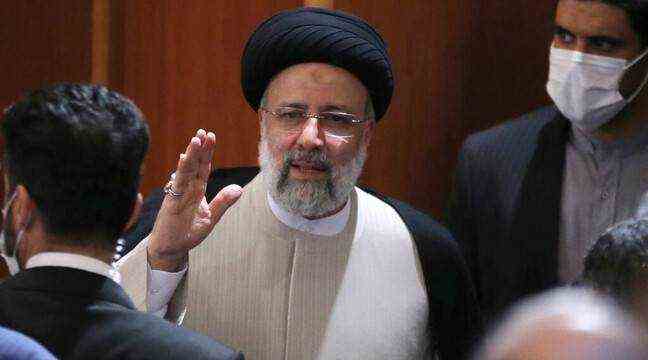Three days after his election to the presidency in Iran, the ultra-conservative Ebrahim Raïssi set the tone on Monday by calling for fruitful negotiations on the nuclear issue and by saying his refusal to meet with US President Joe Biden.
During his first press conference since his election on Friday, Ebrahim Raïssi, a relative of Iranian number one Ali Khamenei, on the other hand affirmed that there were “no obstacles” to the resumption of diplomatic relations with Arabia. Sunni Arabia, regional rival of Shiite Iran, broken off since 2016.
“Psychological warfare waged by the enemies of Iran”
He also said he had “always defended human rights”, while the United States and several Western NGOs accuse him of being responsible for torture and summary executions, among other violations, during his long career with the judiciary.
The new Iranian president, who is due to take office in August, obtained nearly 62% of the vote in a ballot marked by a record abstention for a presidential election. However, he praised during his press conference the “massive” and “significant” presence of the Iranian population in the polling stations “despite the psychological warfare waged by the enemies of Iran”.
Feedback on the Vienna Agreement
The president has limited prerogatives in Iran, where most of the power is in the hands of the Supreme Leader, Ayatollah Ali Khamenei, who is the ultimate decision-maker on sensitive issues such as nuclear. While discussions are being held in Vienna to save the international Iranian nuclear agreement concluded in 2015, Ebrahim Raïssi affirmed that Iran would not allow “negotiations for the sake of negotiating”.
“Any meeting must produce results (…) for the Iranian nation,” he said. The Vienna agreement offers Iran a reduction in Western and UN sanctions in exchange for its commitment never to acquire atomic weapons, and a drastic reduction in its nuclear program, placed under strict control. the UN.
Meet Joe Biden? No thanks
But the deal was torpedoed in 2018 by the decision of former US President Donald Trump to withdraw from it and reinstate the US sanctions that the agreement had lifted. The current negotiations in Vienna aim at a return of the United States to the agreement. The solution is a priori easing of US sanctions in exchange for Tehran’s return to strict application of the pact, Iran having abandoned in response to sanctions most of the safeguards to its controversial nuclear activities that it had accepted in the agreement.
While the predecessor of Ebrahim Raïssi, the reformer Hassan Rohani had opted for an openness towards the West by favoring among other things the agreement of 2015, the new president answered “no” to the question of an American media asking him s ‘he intended to meet Joe Biden in the event that the talks in Vienna would ease sanctions and in order to “settle” the problems between the two countries, enemies for more than 40 years.
Iran in crisis
After a series of meetings in recent months between Iran and Saudi Arabia, whose relations have seen a sawtooth in recent decades, Ebrahim Raïssi affirmed that “there are no obstacles, on the side. from Iran to the reopening of embassies ”.
Regarding the human rights file, the new president, currently at the head of the Judicial Authority, affirmed that “everything that (he) has done during (his) years of service has always been oriented towards defense. of human rights ”, referring Westerners to their own“ violations ”in the field. Asked in 2018 and 2020 on the executions of thousands of opponents in 1988, Ebrahim Raïssi denied having played any role there, as he is accused of in the West, but paid “tribute” to the “order” given according to him by Ayatollah Khomeini, founder of the Islamic Republic of Iran, to carry out this purification.
Ebrahim Raïssi inherits a country in the grip of a serious economic and social crisis, a consequence of American sanctions. He presented himself as the champion of the fight against corruption and the defender of the popular classes in an oil-rich country.

